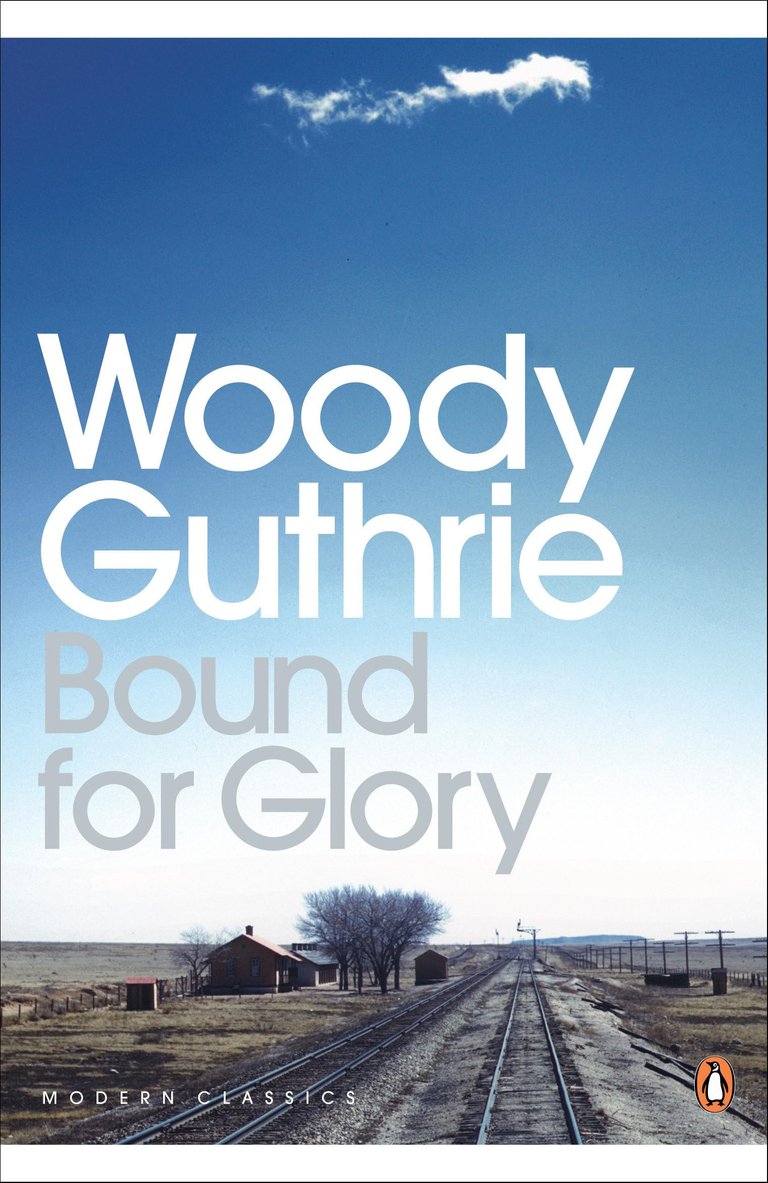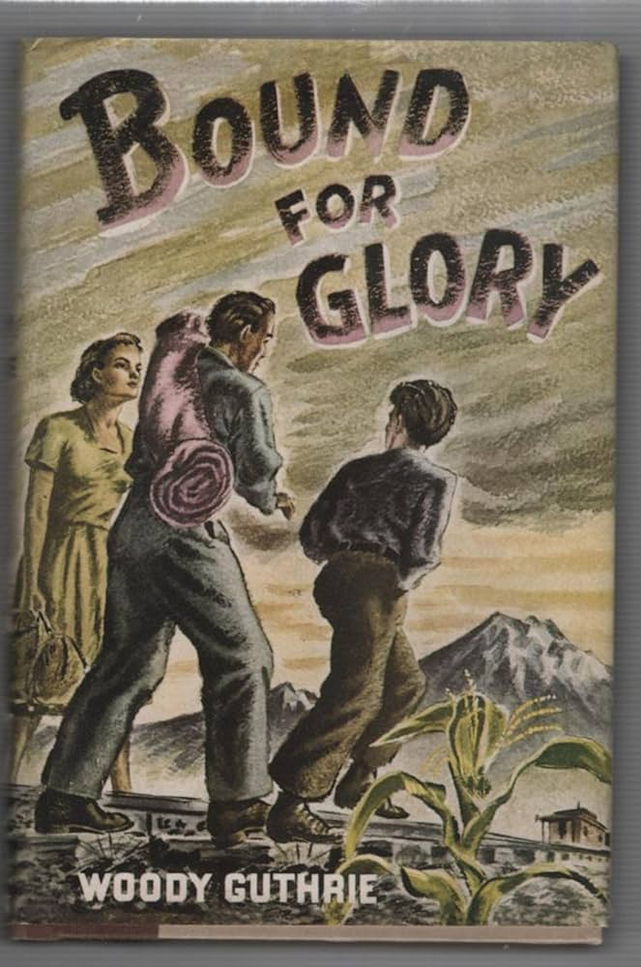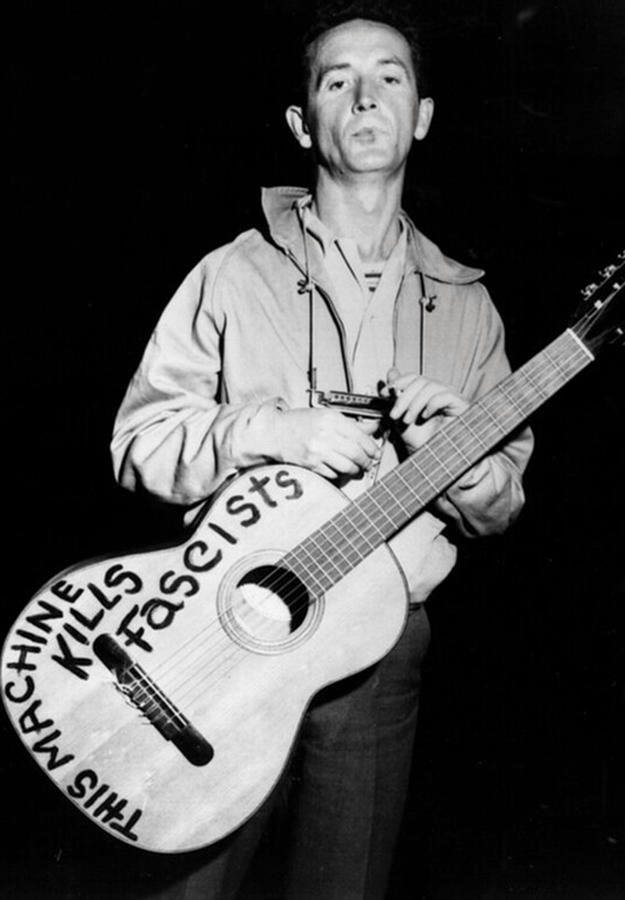Bibliophilia - Dust-Bowl and Great Depression: Bound for Glory by Woody Guthrie
Just recently I posted about Bob Dylan, which in turn inspired me to introduce his influence, Woody Guthrie. Since that post focused entirely on his music, I thought I should talk more about the man and his times, by reviewing his book Bound for Glory. Published in 1943, this work is a kind of memoir, even though Woody was merely 31 years old when it came out. In it he describes growing up in Oklahoma and Texas, between the oil boom and the dust storms, followed by the Great Depression, and ultimately the start of World War Two. It offers a fascinating insight into the world of rural America around the 1930s, and helps us understand the people of those times and their mentality.

image source
When The Wild West Was (not) Tamed.
Woody Guthrie was born in 1912 in a small town in Oklahoma, around a time when the stereotypical Wild West slowly became industrialized and urbanized. As a consequence one may expect it to become tamed or civilized, but that is precisely what did NOT happen (yet, or maybe ever), as the book illustrates so well. For example, when Woody's father explains the need for holstering two six-shooters for the purpose of "going into politics". I didn't know that was requirement, but then again, I can kinda see how it was...
But even the children at Woody's age would engage in elaborately organized acts of violence, for example in the "war" they fought against another gang of kids, using sling-shots to fire rocks at each other, which they first heated red-hot on an iron stove. WOW! Now I pride myself of being from a generation that used to drink from the hose and ride my bike around town until dark (a child of the 80's)... But there is no way to imagine a kids' war of such proportions, at least for me. For my grandparents, however, it's a completely different story, which just shows how radically different our world today is from that of only a century ago.
Economic Boom Going Completely Bust
Two events that Woody describes having had a huge impact on everyday life, was the discovery of oil in his town, and a few years later the hit of the Great Depression. When crude oil started becoming important for making fuels such as gasoline, its discovery typically led to an economic frenzy that seemed completely unsustainable and irresponsible, even from the eyes of a child. Entire towns were constructed in the fastest and cheapest way, with the least possible infrastructure, drawing in multitudes of migrant workers, and those wishing to profit from them. The rise of crime, pollution, and the general degradation of everything nice and stable could not be ignored even by young Woody. He also never failed to point out how little benefit there was from the whole madness, except for the capitalist investors. This would become a major theme in his future works.
Once the economy went bust and the country found itself in what became known as the Great Depression, the tendency was the opposite, though the results were equally bad. Foreclosures, evictions, mass unemployment, and the general lack of paying jobs forced many people to leave their homes and look for work elsewhere. On top of the economic hardship came the dust storms, a result of ploughing up the American prairies, where the wind would carry away the topsoil. Eventually Woody too joined the track of thousands of hobos going to California, thematizing this experience in numerous songs that would make him famous for his Dust Bowl Ballads.

image source
Riding the Freight Trains Looking for Work
What must it have been like to be a hobo in the 1930's? Bound for Glory offers a nicely detailed impression, only matched by John Steinbeck's Grapes of Wrath. Woody introduces random companions he met on the way, either hitchhiking, train hopping, or in some rare cases driving to California in a car they traded their farms for. The stories are all hauntingly similar, making it clear that their hardship resulted from an overall disaster affecting everyone in the same way, rather than due to some personal errors or mishaps. At the same time he tells stories about how the vulnerable are preyed upon, not lastly by officials who charge them money to cross the state line, or tear up their papers, so they can charge them for the lack thereof.
Woody's search for a stable place to live and work leads him from the orchards of southern California to the Pacific Northwest, where the Grand Coolie Dam is being built as one of the early public work projects to combat the Great Depression. Woody's admiration for these kinds of government initiatives becomes apparent not only in his book, but also in his music. He praises the creation of well paying jobs with decent working conditions, opposing the exploitative ways of the private sector. Gradually the socialist streak in his work becomes more defining.
A Voice For the Working Class
Most of Woody Guthrie's songs deal with topics of social justice, in one way or another. Whether he sings about outlaws helping out families in need, or about workers' struggle to form a labor union, his central topic is the everyday struggle of working men. In his book, however, he spends just as much time relating his own struggles in his own two professional fields: painting signs and making music. While the former one is pushed to the fringes due to economic hard times, the latter one becomes highly demanded, especially once its popularity is evident. The only problem though is its focus on working-class topics. Since many radio stations and recording studios don't want to promote a rebel rouser, Woody finds himself out work just as frequently. The other problem he faces, is how many of his promoters assume to know the style and the imagery he needs to project, leading him into cringeful fakeness, which prompts him to throw the towel just as often.
This Machine Kills Fascists
In the end it is World War Two that ultimately confirms his fame. Being seemingly upset at the attack of Perl Harbor, he immediately starts strumming up support for the war, and is soon hired by the government to do it professionally. The fact that the enemy is made up fascist fully convinces Woody of being on the right side, and this passion can be seen in the words of his book. Personally, I must admit that this phase of him is the least interesting. His rallying songs I find a bit dull, and even that part of his book feels a bit like propaganda to me. At least there is no doubt about his honesty of being 100% behind the war effort.

image source
Is It Worth Reading It?
I'd certainly say so, and Bob Dylan seemed to have loved it, being written by his great idol. For me it is most of all a window to a world long gone and almost forgotten. However, seeing the way things are going today, it's not entirely unlikely that we may get to see similar times coming up again. In either case, I thought it was highly interesting to get an impression of the Great Depression, and what the United States was like a hundred years or so ago.
Congratulations @stortebeker! You have completed the following achievement on the Hive blockchain And have been rewarded with New badge(s)
Your next target is to reach 42000 upvotes.
You can view your badges on your board and compare yourself to others in the Ranking
If you no longer want to receive notifications, reply to this comment with the word
STOPHm, I wonder if it's at my library? I've been listening to audio books in the car so maybe this is my next one. I certainly listened to him growing up, he was part of the many many iconic guitarists Dad listened to over the years. Oh and note your typo .. Grapes of Wreath. 🙏
I don't see why they shouldn't have it. Though when I was looking for it, I did the old-school walking into my local bookshop (15 years ago in NZ), where they said they never heard of it, but they could order it by the following week. Actually that was the last time I got a book that way!
I really hope you'll like it. I kind know there were a few ugly bits in it, which I honestly can't quite recall any more, as I must have blocked them out so they wouldn't interfere with the majority of the book I liked.
Thanks for your correction, hahaha! My mind instantly flashed an image of a wreath of grapes, you could wear on your head, complete with leaves, curly vines, and bunches of juicy red grapes. Not sure if the connection is evident, but it may still be useful somewhere...
Hahahah yeah nah that definitely is NOT Grapes of Wrath. I won't hold it against you. Do you find your spelling is declining with age? Not big ones, but random homophones for me. Such shame haha!!!
Did you ever read Mark Lanegans bio? I did, after he died.. well listened to the audio book. Quite dark, but also some really interesting interesting insights into that grunge scene at the time. Just thought you might like it.
TV series wise... Moblands with Pierce Brosnan and Tom Hardy - Helen Mirren as Brosnans midwife is delightful. Second season of Last of Us.
Nice! Thanks again for your suggestions. Not sure if I'm ready for a rock star biography, but that TV show I might give a try.
You know, my spelling has never been that great! Thanks to my pedantic personality I get a kick out of paying attention to things like here and hear, so that has been a bit of a redemption. But even that I've noticed has been slipping a bit. Do you think this could be age related?
Definitely it's age related!!! Horrifying!
😱 Nooooo!!!!